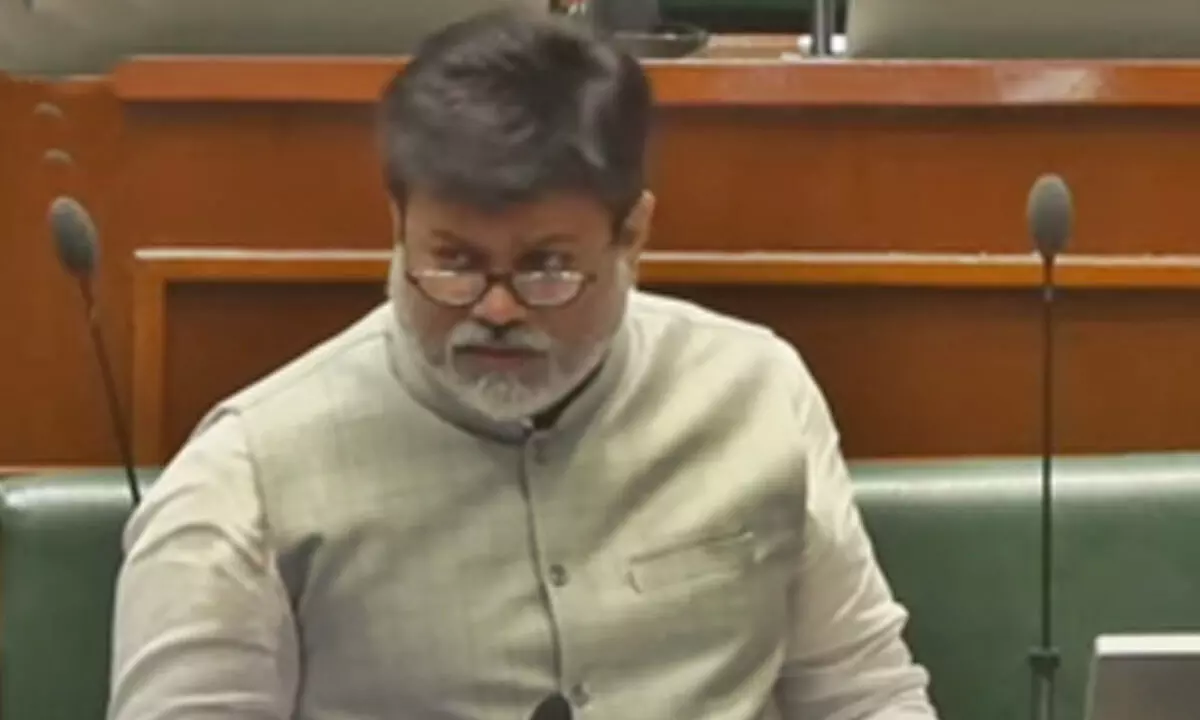Live
- India Faces Blow as Pacer Mohammed Shami Ruled Out for Remainder of Australia Series
- Biden Pardon: Joe Biden Commutes Death Sentences of 37 Inmates, Including Child Killers and Mass Murderers
- South Korea: Yoon believes impeachment trial takes priority over martial law probe
- Strict Action for Non-Adherence to Time Management - DMHO Dr. Swarajya Lakshmi
- Over 13.29 lakh houses approved for rural poor in Maharashtra: Shivraj Chouhan
- District Collector Urges Timely Completion of Indiramma Housing Scheme Survey
- Digital Arrest Scam: Hyderabad Man Duped of ₹7 Lakhs by Fake Crime Branch Police Callers
- Sukhbir Badal seeks President's Police medal for officer who saved his life
- US Firm Accordion Acquires Merilytics, Launches 1,500-Seater Office in Hyderabad
- Free Medical Camp Organized by Alampur Advocate Bar Association
Just In
Maha govt tables bill for regulation of prisons, correctional services

The Maharashtra Prisons and Correctional Services Bill, 2024 to regulate prisons, correctional services and prisoners was tabled by the Shinde government on Thursday in the Assembly.
Mumbai: The Maharashtra Prisons and Correctional Services Bill, 2024 to regulate prisons, correctional services and prisoners was tabled by the Shinde government on Thursday in the Assembly.
The Bill was tabled by state Minister Uday Samant and aims to holistically address all relevant issues relating to prison administration as the pre-Independence era archaic laws need to be repealed and replaced by a consolidated, progressive and robust law in tune with contemporary modern-day needs and correctional ideology.
The Bill has proposed categories of prisons such as special prisons, open prisons for women, temporary prisons, open colonies and Boratkar institutions. Open prisons and colonies will assist prisoners in their rehabilitation and reintegration into society after release. There is a provision for the constitution of the Prison and Correctional Services Force, the establishment of a welfare fund for all officers and staff of the prison and prisoners.
It proposes prison segregation of various categories of prisoners and for their special needs such as women, transgender, undertrials, convicted, high-risk prisoners, habitual offenders, recidivist prisoners, young offenders and civil prisoners.
In the wake of the death of an inmate in the prison, it will be mandatory for the medical officer to record all relevant details and particulars of the case and the officer in charge shall immediately inform about the dearth to the concerned Deputy Inspector General and the Director General. They shall inform the National Human Rights Commission and other authorities.
The prison staff or officer, designated by the Superintendent shall examine everything carried in or out of the prison and may stop and search or cause to be searched any person, suspected of bringing any prohibited articles or taking away any property belonging to the prison. If any of such article or property is found, the prison staff or officer shall give immediate intimation to the officer in charge of the prison.
The Director General, the Special Inspector General or the Deputy Inspector General may take disciplinary action against any officer or staff of prison for misconduct.
The Bill has proposed power of arrest without warrant in the case of assaults and damage to the property and any attempts to commit a cognizable office which involves or which is likely to involve imminent danger to the life of any person engaged in carrying on any work related to prisoners of officers and staff of prison or any other person or prison property.
The Director General shall ensure that all prisons are inspected by an officer of appropriate rank at periodic intervals. The government shall constitute a welfare fund for the welfare of all officers and staff and correctional services.
In a serious bid to avoid an unholy nexus between the prison staff and inmates, the Bill has proposed that the officers and staff and their relatives shall not have any business dealings with prisoners and interest in prison contracts directly or indirectly. They shall not accept any gift from a prisoner or prisoners’ relatives or friends or a person having any dealings with the prisons.
Similarly, it will be mandatory for the prisoners to strictly follow rules about discipline. In the case of a breach, the officer in charge will have powers to impose punishments for committing prison offences, including unauthorised use or possession of wireless communication devices, mobile phones, electronic devices, tress-passing or attempting to trespass, loitering in and around the prison premises where the entry is prohibited, unauthorised communication with any person outside prison, smuggling or attempt to smuggle of any prohibited article, participation or organisation of anti-social activities like gambling and betting and sexual harassment or sodomy.
According to the Bill, separate enclosures or wards for women and transgender prisoners both trans men and trans women may be provided and they shall be provided access to healthcare and correctional programmes.
Further, the Bill has proposed aftercare rehabilitation services to all needy prisoners released from prison with a view to ensuring their rehabilitation and reintegration into society.

© 2024 Hyderabad Media House Limited/The Hans India. All rights reserved. Powered by hocalwire.com






